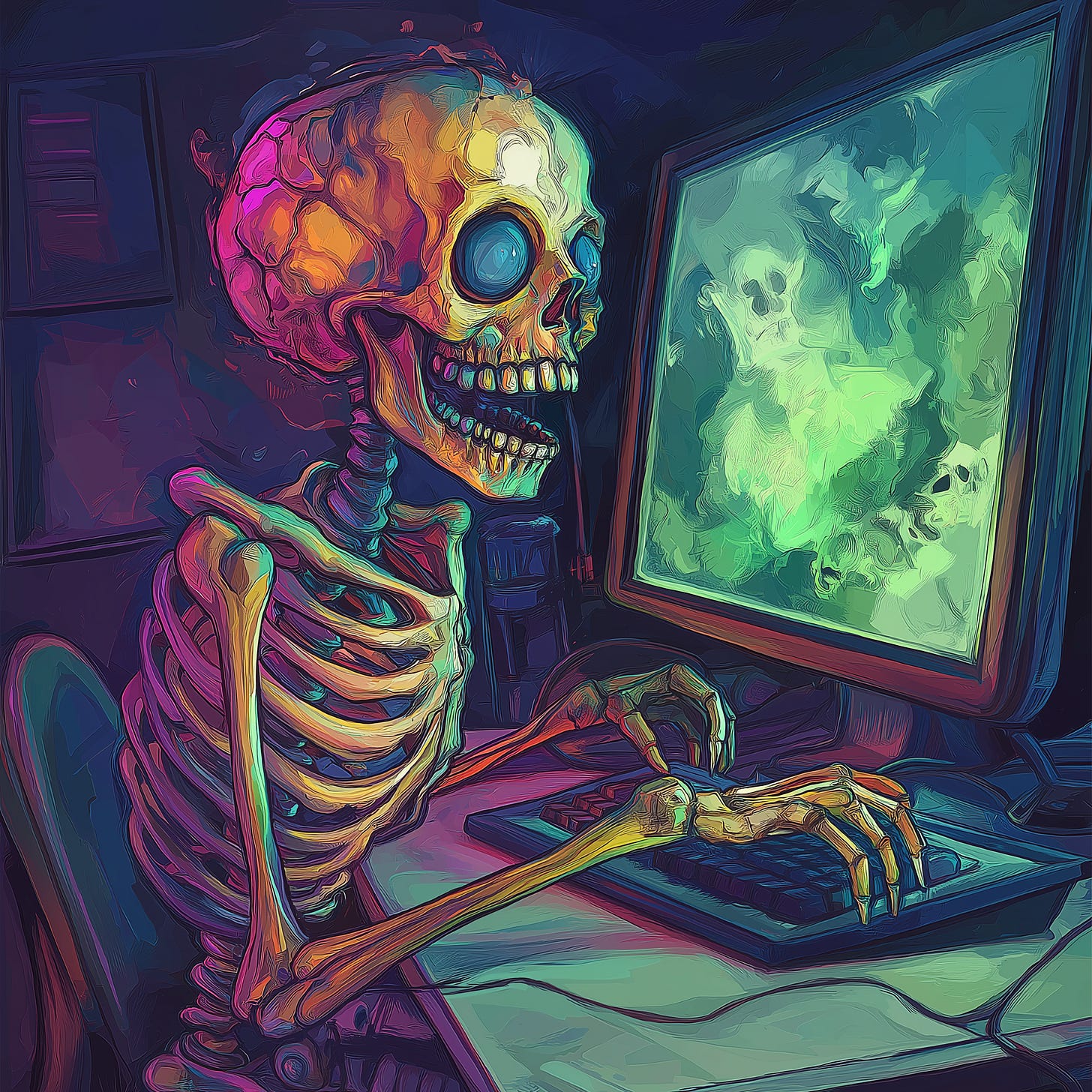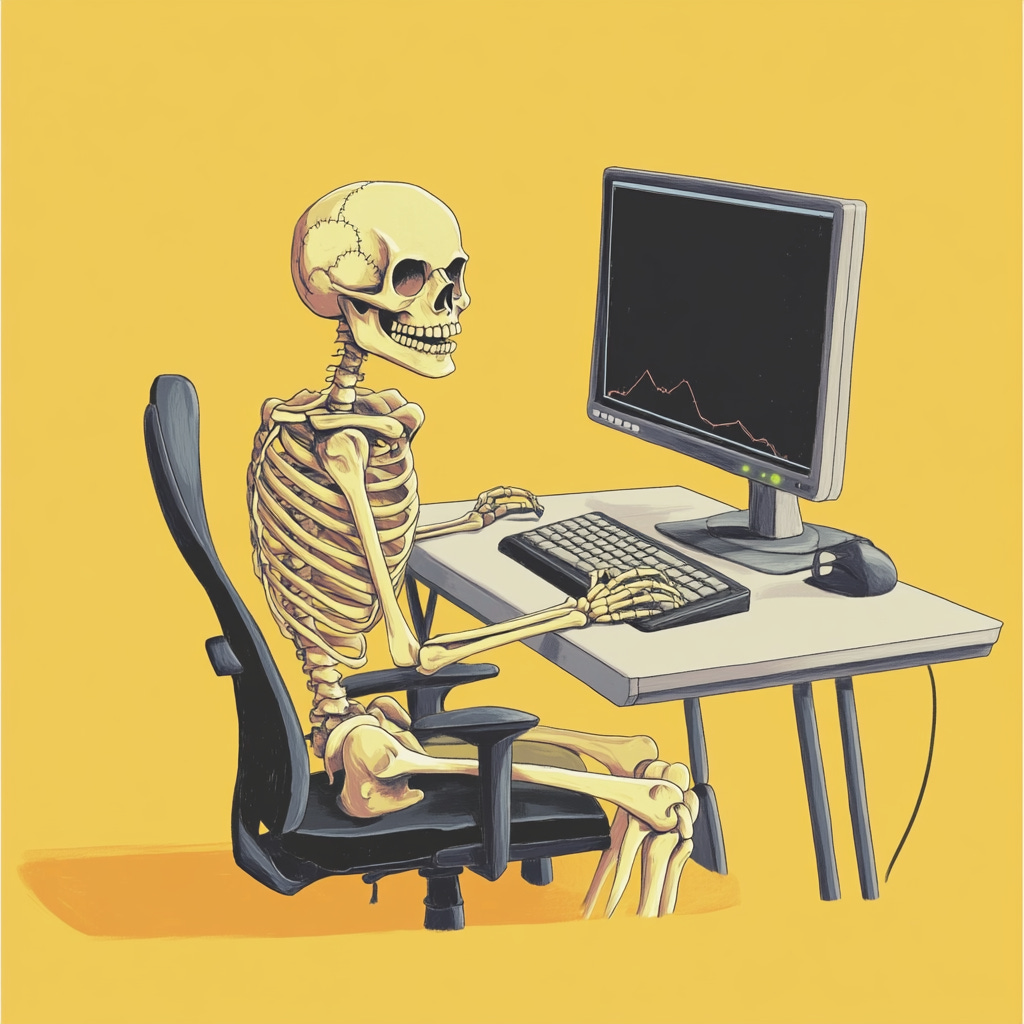My Dad is a brilliant bullshitter.
Once, astonished at how cash would slide out of an ATM, I asked him how it worked. I knew that a magic money machine was a pretty big advantage if only one could glean its mysteries. “Well son,” he said, “there’s a man sitting behind the wall who listens to the buttons I press and pokes the money through the hole.” I looked apprehensively at the wall and thought about what a dark, solitary life the man must lead in such a job.
Another was for my sister and I’s benefit. As we’d drive through Hobart’s CBD, Dad had the uncanny ability to change the traffic lights to green for us, just by clapping. We’d be approaching an intersection, tell him to change the lights, and he’d raise his arms and theatrically slap his hands together - just as the other traffic lights were turning orange. Goodness we were easy to fool. We never even questioned why he could perform this magic trick sometimes but not others for vague, unknowable reasons. I was a simple child. Still am.
Given all this, it’s understandable I’m a little suspicious of what I think I know as an adult. Following the grandiosity of our teenage years, a mark of maturity is being humble about what they know. Donald Rumsfeld’s convoluted “unknown unknowns” quote is really just explicating on this modern day superpower; intellectual humility. I believe it’s a superpower to know what you don’t know, which is basically everything. Sorry. The upshot is that research turned up positive findings for intellectual humility, including more accuracy in critical thinking, more positive interactions with people, and better decision making. On the downside, people generally like charisma and confidence, generally the opposite of intellectual humility. That’s one bug we’re still expunging from our political organs.
There is a palpable, public craving for charismatic leadership. Australia is despairing over a choice between two nondescript party leaders at the next federal election, and the United States just opted for one of the most charismatic candidates to exist in modern times. Beyond politics, the internet is steadily transforming into a pile of speculation and conjecture that make discerning actual truth a competitive advantage. The king commodity of the internet - engagement - isn’t driven by facts and epistemological accuracy, but by how fire your take is.
What we actually know, in other words, is increasingly obscured by mountains of bullshit. Not in the hilarious way my Dad did it either. So how do we know what we know?
How We Know Things
Putting aside interminable debates about the nature of truth, I’ll split how we know things into a satisfying list of threes:
1. We know it subjectively - our internal thoughts, feelings and emotions, the only thing we’ll ever truly know to be true.
2. We know it intersubjectively - we’ve used the scientific method to suggest something specific about the world, and had others replicate our findings. This type of truth is always provisional, always changing.
3. We infer from what others have intersubjectively verified - the most common method in education and communication, where we use language to learn from what others say they’ve learned. This is the realm of conjecture and opinion, even more provisional as the conversation moves away from the second category.
Subjective truth is what dominates our search for meaning. It’s the sensory cues from which we’re motivated to lead the life we do and understand ourselves. The second is, of course, the scientific method. The amount of people who have firsthand discovered something completely new about the universe is basically zero. No offense - it’s hard to discover something completely new. Most of us are not scientists. Most of what we intersubjectively verify is small-scale stuff, like “hey sis, do you think Dad could really change traffic lights by clapping?” “Probably not, bro.” Solved.
The third method is how we come to know basically everything outside of our immediate experience and get around the fact that we have fuckall time on earth to discover all there is to know . My mate who spent four years writing an obscure PhD (and if you’re reading this bud - proud of you) will testify how hard it is to get genuine discovery recognised by the broader academic community. I can read in a couple of hours what took him years to theorize and formalize. Virtually every abstract fact about the universe we know or think we know takes this form.
That’s why primary sources are so powerful. That’s why actually reading The Wealth of Nations, despite how hard it is, is the best way to develop opinions on economics, The Second Sex for feminism, Orientalism for colonial studies, or On the Origin of the Species for biology. These texts are the OGs, having withstood the scrutiny of hundreds of years. They’re not hot takes; they’re events in our intellectual history, with far-reaching explanatory powers.
You can probably see why this is so unappealing; these texts are a slog. It is hard to form a truly informed opinion. It requires friction. Even academics don’t always read primary sources. In addition to this, learning easily has taken prime position in our cultural milleu. Give me a hack instead of a course. It is, frankly, much easier and more interesting to learn about Dostoyevski through a five minute video about him.
Observe:
Wasn’t that great? Videos spoon-feed our brains with information. The problem with passive mediums - and the ever-dwindling length of time humans are willing to commit to learning - is that they can never, truly mirror the source material. The actual content we enjoy learning so much about is never truly experienced. In fact, these days there is robust evidence that learning is so intertwined with physical embodiment, that babies can’t learn language from videos or audio recordings - they literally need to see and hear adults talking.
Like fake facts floating on a house of cards of hearsay and rumor, videos can never fully capture the essence of a thing. We seem to be marching further and further from our true sources of knowing.
The Dead Internet
Proponents of the Dead Internet Theory - that one day the internet will just be bots producing nonsense and talking to each other - might be on to something. This goes beyond chat bots gaslighting you about books and people that don’t exist or never said anything - even on-ramps to the internet are becoming embedded with Gemini and ChatGPT. We are, in addition to this, becoming very good at searching for information, but terrible at learning and retaining it. That’s one of the reasons our public debate feels so awful. It’s so obvious the people who are loudest are full of shit. We know, somewhere in our waters, that intellectual humility and, ergo, the decisions we’re collectively making are often not based on the best available information, but owning the other side.
Maybe books have something to do with it. I get alarmed when I read articles like this one that show Kids These Days don’t read books. Hopes to publish my own book (later this year!) shrink as the market for said books also shrinks. So it is a little selfish of me and my pet past time of reading and buying books off Amazon. I also like to think that our new way of gleaning information through bite-size videos and 140-character tweets is inferior to plumbing an idea to its epistemological depths through long form texts.
Here the research actually agrees with me. The medium, in turns out, matters when it comes to learning. Screens are bad for it. Information retained by reading on a screen is diminished compared to reading on a page (sorry guys, but weekly prints of Normalwise aren’t yet economically viable). Even the nature of learning, when reduced to themes or 2-minute elevator pitches, short-circuits the actual challenge of persevering with hard ideas long enough that they graft onto your understanding of the world. This tracks with the growing phenomena of students complaining that classes are too hard.
Coincidentally and ironically I was watching a 10-minute YouTube video on science on the outstanding channel, Kurtzgesagt. To summarise, the channel went on a year-long hunt to find the origin of a seemingly well known fact; that if you were to unwind your blood vessels, they would be over 100,000km long, enough to wrap around the earth. After 12 months of fruitless dead-ends, they finally located the origin - a guesstimate of an obscure 1920s physician, which got picked up by certain elements of the media and everyone forgot. The urban legend was born.
What is so compelling about this circus is that even experts - the ones who study this for a living - all knew the fact, even used it in their ordinary lives, but didn’t know how they knew it. I saw a reel where a literary fan found a quote by Dostoyevsky on book review site Goodreads. It seemed a little suspicious, so he began Googling and searching for the origin. It wasn’t Dostoyevsky. It wasn’t even a famous author. It turns out the quote was the guy, posting it on Goodreads years earlier in a review. Somehow, The Algorithms had conspired to attribute a made-up quote to one of the all-time writers. If you didn’t know - heck, even if you did - the internet had no idea. Who would check that?
There is an outrageous volume of new information put into the world every day. I wonder sometimes how we’ll know what we think we know in the future, when it is so easy to come up with unfounded ideas and put them out into the world in compelling ways. The internet, dead or alive, bullshits in a way my dad’s joking doesn’t; it’s deadly serious, these ideas accumulating and referencing unreferencable facts, these thoughts posted without redaction or regret. Don’t kill your brain with dead facts.
And, more importantly, books should remain relevant so I can get published.













Share this post